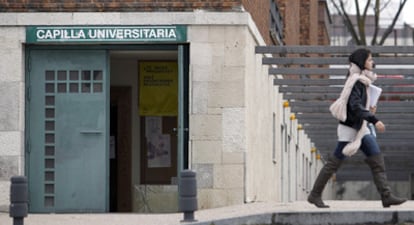Chapel row: do faculties need faith?
Lurid protest at university prayer room opens new flank in secular debate
"Spain undertook the political transition, but the religious transition fell by the wayside," says Jorge Fernández, spokesman for the Federation of Evangelical Religious Groups in Spain. And education is probably the area where his words take on the greatest meaning. Proof of it is the presence of the Catholic Church in the school curriculum through religion class, or the government's need to negotiate education laws with the Spanish bishops. The vast majority of fully private and state-assisted private schools in Spain are Roman Catholic.
This reality is a conditioning factor in the ongoing debate about the place of religious rites and symbols in public-education centers - a debate that sometimes sparks fierce confrontations and attitudes that are uncalled for.
Occasionally, things can escalate, such as when, one day earlier this month, around 50 people at Madrid's Complutense University burst into the chapel at the Somosaguas campus, where three students were praying. The protesters proceeded to read a manifesto against the role of women according to the Catholic Church and displayed doctored images of Pope Benedict XVI bedecked with a swastika. Some female participants also stripped from the waist up.
The 15-minute performance prompted a huge outcry in academic, political and religious circles. It was also rejected by sectors that actually oppose having chapels on campus, such as the Complutense rector, Carlos Berzosa, who has opened an investigation and publicly condemned the event. Four students have since been arrested for their role in the protest.
The debate has moved up from its regular circuit at elementary and high schools (whose crosses on the wall do not constitute religious indoctrination, according to a recent ruling by the European Court of Human Rights in Strasbourg) to university circles. Should there be Catholic chapels at public universities? At least 12 campuses have them in Madrid, Castilla y León, Andalusia, the Valencian region, the Canary Islands, Asturias and Navarre.
Detractors feel that the presence of a chapel on campus "is improper, eccentric and outdated for a public institution, even more so for a higher education center [...] in a state that we could define as somewhere between nondenominational and secular," writes Mariano Fernández Enguita, sociology professor at the Complutense University who has requested the closure of the chapel on his university's campus.
Meanwhile, more than 150 college educators from all over Spain have signed a document professing their rejection of "the way in which the [...] performance was carried out," but insisting that at no time did the protesters mean to question anyone's right to freedom of worship, whether individually or collectively. This group also asks for chapels to be shuttered on the basis that their presence is only "a privilege of the Catholic Church, and it is high time that they were done away with at public universities."
Supporters, on the other hand, invoke freedom of worship and ask university managers to guarantee that any members of the student body who wish to pray can do so. "It is obvious that a non-believer might take a different stance on this, but we view it as a human and spiritual service for people who desire it," says Feliciano Rodríguez, delegate of Madrid's University Pastoral.
Pro-chapel activists also appeal to tradition. The origin of Spanish universities is closely tied to the Church, notes Ana Cuevas, secretary general of Salamanca University, the country's oldest campus. Cuevas explains that college chapels have a special status, since they do not depend on the area's Catholic diocese; instead, they are independent bodies with their own lines of financing, and answer to school deans and the university rector.
At the Complutense University, which operates five chapels in as many schools, there have been two formal petitions to have them shut down at the Schools of Psychology and Geography & History. In the latter case, the request came from Dean Luis Enrique Otero with the backing of two-thirds of the faculty vote. Otero says they addressed this issue before the latest controversy made media headlines. "Catholics already have public spaces to express their beliefs," he said.
Regardless of whether prayer rooms should remain within or without the confines of campus, universities ask that their independence be respected and that each institution be allowed to make its own decision. Javier Uceda, head of CRUMA, the body that brings together Madrid's college presidents, adds that consensus should be sought within each university. "CRUMA does not have an assessment of the situation or a joint position on the matter, because until now it was not a pressing issue, nor was it at the center of debate."

Tu suscripción se está usando en otro dispositivo
¿Quieres añadir otro usuario a tu suscripción?
Si continúas leyendo en este dispositivo, no se podrá leer en el otro.
FlechaTu suscripción se está usando en otro dispositivo y solo puedes acceder a EL PAÍS desde un dispositivo a la vez.
Si quieres compartir tu cuenta, cambia tu suscripción a la modalidad Premium, así podrás añadir otro usuario. Cada uno accederá con su propia cuenta de email, lo que os permitirá personalizar vuestra experiencia en EL PAÍS.
¿Tienes una suscripción de empresa? Accede aquí para contratar más cuentas.
En el caso de no saber quién está usando tu cuenta, te recomendamos cambiar tu contraseña aquí.
Si decides continuar compartiendo tu cuenta, este mensaje se mostrará en tu dispositivo y en el de la otra persona que está usando tu cuenta de forma indefinida, afectando a tu experiencia de lectura. Puedes consultar aquí los términos y condiciones de la suscripción digital.








































